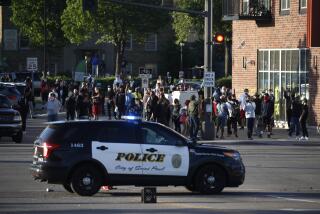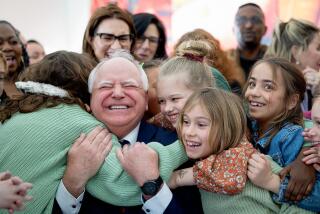Mayoral Contest Paints a Darker Twin Cities
- Share via
MINNEAPOLIS — This lake-studded city, with its enviable park system and good schools, enjoys a reputation as a civic-minded metropolis that works. But as Mayor Don Fraser steps aside after 14 years of mostly prosperous, stable times, the campaign to take his place has painted a different picture--of a city, just like others, beset by crime, racial division and a shrinking middle class.
Residents have been disillusioned by uncharacteristically inept management downtown, including a massive computer foul-up of water bills and the forced resignation of three top school administrators after allegations of mismanagement.
But polls and coffee-shop conversation suggest that the biggest concern is crime.
By national measures, this city of 370,000 people remains relatively peaceable. Last year, the rate of violent crime in the Twin Cities area was 478 incidents per 100,000 people, nearly half of the national average for urban areas.
The rate has increased sharply in recent years, however. The annual number of homicides jumped from 28 to 64 between 1981 and 1991, and reported assaults surged from 5,473 to 13,116 during the same period, according to police statistics.
The two candidates on today’s ballot--John Derus, a former county commissioner, and Sharon Sayles Belton, the president of the City Council--have both tried to stake out the crime issue for themselves.
Derus, 53, has been the most strident, describing gang violence and homeowners desperate to sell their houses and move out of the city. He has proposed a 20% increase in the number of police officers.
Sayles Belton, 42, has cast herself as a leader who can unite the community. “This election is about the city of Minneapolis either moving into the future or living in the past, either coming together as a diverse and strong community or staying separated along traditional and divisive lines,” she said.
But as the campaign progressed, Sayles Belton tried to show that she was tackling crime issues as hard or harder than Derus.
Beneath the surface is a contest over whether Minneapolis should continue its benevolent approach to social problems or turn more hardheaded. During the 1980s, the Twin Cities area gained nearly 20% more jobs, but within the Minneapolis city limits, the number of jobs declined. Property tax bills have been rising to help pay for social programs, and city residents are beginning to cry foul.
“We’re seeing a flight of capital, both public and private, out to the metro periphery,” said Neal Peirce, a syndicated urban affairs columnist.
“Minnesota state government in the ‘80s never showed the imagination or the progressivism to work with poor populations, nor did the federal government . . . so now we’re reaping a whirlwind of social neglect, and it’s even showing up, amazingly, in places like Minneapolis.”
More to Read
Sign up for Essential California
The most important California stories and recommendations in your inbox every morning.
You may occasionally receive promotional content from the Los Angeles Times.













